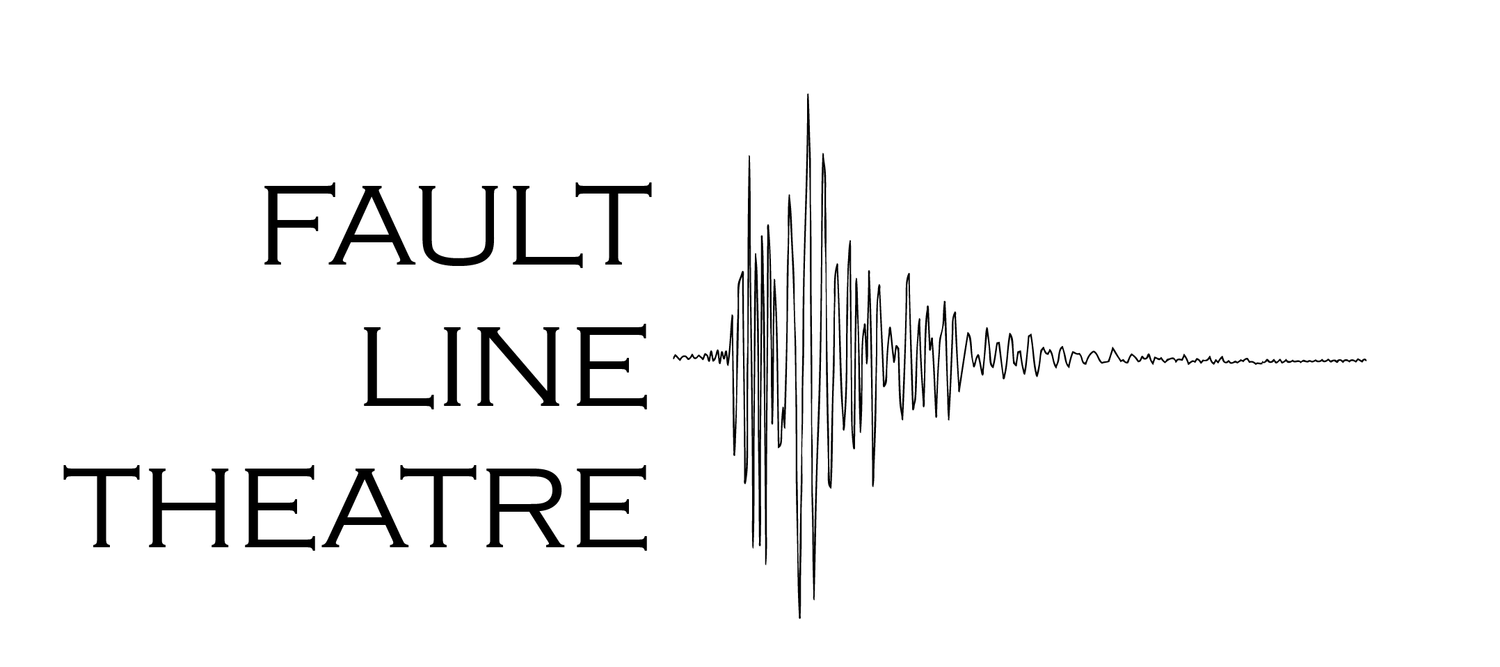We love our Hindsight design team and we’re so happy Lighting & Sound America did to. Check out this lovely review of Hindsight by Alix Sobler.
Theatre in Review: Hindsight (Fault Line Theatre/Paradise Factory)
By David Barbour
In Hindsight, Alix Sobler stakes a claim on some of the most treacherous territory on the dramatic map, doing so with remarkable assurance and skill. It's a rule of thumb that the problems of writing a play are fascinating to audiences in the low single digits. But Sobler is armed with an inquiring mind and a sprightly wit, and her self-referential games are played in pursuit of a nagging question that should concern us all. Indeed, it should be keeping us up nights.
At center stage in Hindsight is Sobler, playing, yes, The Playwright, who is contacted by Aaron Rossini -- artistic director of Fault Line Theatre and the director of Hindsight -- offering her a commission. (Just to guide you in this hall of mirrors, Rossini is played by the actor Luis Vega, who deftly handles several roles.) Because the original production date is just before the election of 2020, Sobler seizes on a theme that couldn't be more of the moment: The fact that "everyone has an Unshakeable Belief."
Soon, she is working on a drama about the Federal Communications Commission's elimination of the Fairness Doctrine, the 1949 rule stating that "broadcast licensees were required to devote a reasonable amount of time to discussion of controversial issues of importance and give reasonable opportunity for the presentation of opposing viewpoints of those issues." Sound a little dry? Even the writer's mind wanders a little, shifting to Thanksgiving dinner with her family, an affair that descends into the now-familiar American holiday horror, with everyone scrapping, acrimoniously, over all matters Trumpian, including taxation, inequality, and immigration. Looking on, aghast, the playwright freezes the scene at its nadir, when a cousin invites Sobler's husband, a Canadian, to go back where he came from.
Nevertheless, Hindsight's then-and-now structure is the foundation on which she -- sometimes playfully, sometimes in deadly earnest -- builds her argument: that the elimination of the Fairness Doctrine in 1987 -- an act of Reagan-era exuberance -- put American society on the path to 2021, when people will believe anything, no matter how absurd or unprovable, if it supports their pre-existing prejudices. For example: that the presidential election was stolen by Chinese spies, the January 6 Capitol riot was a tourist trip, and that Ivermectin is a cure-all. Facts? We don't want no stinkin' facts.
The FCC scenes have plenty of crackle as an apparently minor decision becomes the basis for a furious battle. Committee chairman Dennis Patrick wants the rule dropped, believing as he does in the magical powers of the free market. Patricia Diaz Dennis, a conservative Democrat, is a free-speech absolutist, but she also wants to see advancement for underrepresented minorities on the business side. Mimi Weyforth Dawson, a Republican team player, will vote for elimination if it leads to more women on TV, modeling roles as cops and doctors for future generations. James H. Quello, a Nixon appointee, is alarmed by a certain California-based radio shock jock -- you get one guess -- whose constant fulminations about "feminazis" and other liberals is attracting a growing audience. Legal advisor Richard Bozzelli poses the possibility of a lunatic fringe organization -- say, the Flat Earth Society -- buying up the major media outlets in a market and flooding it with intellectual sludge. That this is even a possibility is because the FCC has relaxed "the cap," the rule limiting the number of radio and TV stations a single entity can own in any given market.
Sobler bats around these arguments nimbly, aided by an articulate cast and Rossini's sharp direction. Things get even livelier when the characters rebel against their creator, accusing her of shading facts and omitting important truths. The FCC panel attacks her argument at its roots, citing other inflection points that have contributed to the dumbing-down of American discourse. Back at that Thanksgiving dinner, a cousin sullenly notes, "Well. I mean. We all saw your last play. It wasn't exactly...I don't know. It just seemed really problematic. I mean, you didn't account for the economic privilege, not to mention the gender dynamics, the implications of race...it was very...focused on making your point. You ignored a lot of other issues." Even around the holiday table, everyone's a critic.
It's good to be back in a theatre again, experiencing a full-throated battle of ideas. It's equally good to make the acquaintance of Sobler, who isn't afraid to allow each character his or her say, even if she clearly disagrees. The arguments sound especially persuasive coming from a cast that includes Andrea Abello, charming yet tough-minded as Diaz; Craig Wesley Divino, oozing self-satisfaction as Patrick; Lynette R. Freeman, a deft intellectual poker player as Dawson; and Daniel Pearceas Quello, the committee's troubled conscience.
The production features a fairly basic design scheme. Tristan Jeffers' scenic design is based around two different table gatherings, with Cha See's lighting using different color approaches to guide the action in and out of different realities. Dina El-Aziz's costumes are marked by a number of '80s-era power-wardrobe elements. Chad Raines' sound design channels a playlist of the decade's pop hits along with authentic-sounding excerpts from Rush Limbaugh broadcasts.
Among other things, Hindsight offers a hard-to-forget lesson in historical irony: As one of the characters notes, the elimination of the Fairness Doctrine was opposed by a united front that ranged from the ACLU to Phyllis Schlafly, proof positive that politics makes strange bedfellows. Clearly, we live in a universe of unintended consequences. Maybe this country isn't sliding into fascism, as Hindsight sometimes worries. And maybe a single comic drama can't explain the mess we're in. But it's good news that writers with Sobler's talent are willing to take on the challenge.
View Original Article







